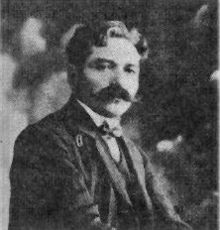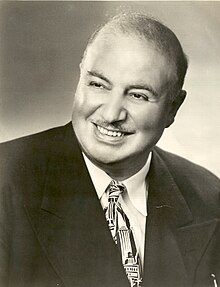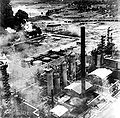Krikor Amirian: Difference between revisions
No edit summary |
No edit summary |
||
| Line 14: | Line 14: | ||
Sebouh (1925-)<br /> |
Sebouh (1925-)<br /> |
||
Dro (1928-) |
Dro (1928-) |
||
| father = Eryia Amirian |
| father = <ref>Eryia Amirian</ref> |
||
| mother = Vartanoush Amirian |
| mother = <ref>Vartanoush Amirian</ref> |
||
| religion = [[Armenian Apostolic Church]] |
| religion = [[Armenian Apostolic Church]] |
||
| serviceyears = 1908-1917 |
| serviceyears = 1908-1917 |
||
Revision as of 03:36, 1 December 2010
Krikor Amirian | |
|---|---|
 Krikor Amirian in the early 1950's. | |
| Personal details | |
| Born | June 20, 1888 Bayburt, Ottoman Empire |
| Died | August 1, 1964 Los Angeles, California, USA |
| Nationality | Armenian |
| Political party | Armenian Revolutionary Federation |
| Spouse | Siranoush Garabedian (1896-1975) |
| Children | Christine (1924-2010) Sebouh (1925-) |
| Parents | |
| Military service | |
| Allegiance | |
| Branch/service | Ottoman Army First Armenian Volunteer Regiment |
| Years of service | 1908-1917 |
| Rank | Lieutenant (Agha) |
| Battles/wars | First Balkan War Armenian Genocide |
Krikor Amirian (June 20, 1888 - August 1, 1964) was an Armenian Revolutionary and participated in the construction of the Democratic Republic of Armenia.
Biography
Early life
Krikor Amirian was born on June 20, 1888, in Bayburt, Turkey. The Amirian Family had been very influential citizens in Bayburt. Amirian had grown up during a sad time period, especially during the Hamidian Massacres. In early 1895, Sultan Abdul Hamid II ordered the extermination of all the Armenians in the Ottoman Empire. He had ordered thousand's of Turkish troops to take control of Bayburt, because Bayburt was one of the most heavily Armenian cities on the Eastern side of the Ottoman Empire. When Turkish troops had entered the city, a massive revolt erupted on October 26, 1895. After relentless fighting, the Armenian Rebellions were trying to negotiate peace with officials for Bayburt. Eryia Amirian, Amirian's father, was chosen to represent the city to speak of truce with Turkish officials. Instead, he was brutally murdered with a bullet in his back.
Amirian had been educated at a local Armenian school in Bayburt, and then eventually went to the Turkish Army Officer's Academy. He was promoted to the rank of Lieutenant. He had served during the First Balkan War, which took place from 1912-1913. In early 1913, Amirian was arrested by Bulgarian Solders and thrown in prison. In mid-1913, after the signing of the Treaty of London, Amirian was finally released.
World War I
In 1914-1915, Amirian served as General Andranik Toros Ozanian's personal bodyguard and tutor. He was also a personal friend of famed General Drastamat Kanayan, also known as General Dro. He was also a close friend of the Armenian Youth Federation founder Garegin Ter-Harutiunian or also known as Garegin Njdeh. On June 28, 1914, Gavrilo Princip decided to make a decision that changed the map of Europe forever by assassinating the heir to the Austro-Hungarian Empire, Archduke Franz Ferdinand. One month later, World War I erupted in Europe. By 1915, the war reached the Ottoman Empire and triggered Armenian Genocide, which resulted in the death of over 1.5 million Armenians. Amirian was traumatically affected after the massacre of his family in Erzincan and the suicidal death of his mother, Vartanoush. The only surviving member of the Amirian family was Haiganoush, Krikor Amirian's oldest sister.

On April 17, 1916, Russian General V. P. Lyakhov led a massive assault on Bayburt, in order to drive out the Turkish and German soldiers stationed in the city, in which he succeeded. In the meantime, Amirian served in the First Armenian Volunteer Regiment in which he was positioned in Southern Russia, Western Persia, and Eastern Turkey. He served under the command of General Tovmas Nazarbekian, Drastamat Kanayan, and Andranik Ozanian. After the deposal of Tsar Nicholas II and signing of the Treaty of Brest-Litovsk, the First Armenian Regiment had been marred. The reason of this was that all the Armenian rebellion forces were being supplied by the Russian Empire and after the signing of the Treaty of Brest-Litovsk, the Russian Empire was officially out of the war and all the supplies to the First Armenian Volunteer Regiment had collapsed. Though supplies to the Armenians from Russia had been dissolved, Amirian and the First Armenian Volunteer Regiment continued there cause with out Russian support and instead relied heavily on supplies from the British Empire.

Post World War I
After the end of World War I in 1918, Amirian returned to Sucrati, an Armenian neighborhood in Istanbul, where he served as a Director of an Armenian Orphanage that was housed in a Turkish Palace. In the early 1920s, Amirian and General Dro both fled to Romania. Dro was placed in charge of the Oil Refineries and Amirian was appointed as one of the Management Officer's. In 1923, Amirian married Siranoush, his wife of 41 years. A year later, Amirian had his first child, Christine. He later had two sons, Sebouh in 1925 and Dro in 1928. He had also lived with his older sibling, Haiganoush and his niece Alene. Haiganoush was George Mardikian's mother and Alene was his youngest sister.
World War II
During World War II, Amirian and his family dealt with Nazi Occupation of the Oil Fields. All the men who ran the Oil Refineries were against the Nazi Regime, including Amirian. They were forced to supply the armies of Nazi General's Erwin Rommel, Friedrich Paulus, Hans-Jürgen Bernhard Theodor von Arnim, and Albert Kesselring with oil, gas, food, and water. The Oil Refineries also supplied the armies of the infamous Romanian Dictator Ion Antonescu. They also had to supply the German and Romanian forces during the Battle of Stalingrad. Because of the major importance the Ghoukasian Oil Refineries and the other surrounding Oil Refineries had on the war, American President Franklin D. Roosevelt and British Prime Minister Winston Churchill worked with General Jacob E. Smart at the 1942 Casablanca Conference to discuss Operation Tidal Wave. Operation Tidal Wave was a massive air bombing of the Ploiesti refineries by British and American Forces. The Operation left complete and utter destruction in Ploiești. Amirian and all the men in charge of the refinery had to deal with the massive devastation after 40% of the fields were destroyed.
In August 1944, during the Jassy-Kishinev Offensive, Russian troops were finally able to liberate the Oil Fields and Romania, in which Amirian had risen in his ranking. General Dro abandoned Amirian after he left in 1941 to join Hitler's Military Command, leaving Amirian and Alexander Sharafian as managers of the refineries. Dro was placed in charge of the Armenische Legion.


Post World War II
After the end of the War, Amirian and his family escaped to Austria and finally to Italy. When he arrived in Rome, he was reunited with his nephew George Mardikian. In 1951, President Harry Truman had awarded George Mardikian the Presidential Medal of Freedom for supplying food to Coalition Forces and civilians during World War II and the Korean War. He also was responsible for the migration of over 5,000 Armenian's from German refugee camps to the United States after World War II. Amirian finally moved to the United States in 1948, with his wife and youngest child. His two other children soon joined him five years later. His two other children had to wait five years, until the First Displaced Person Act was finally passed.

Later Life
Amirian still continued his dedicated work in the Armenian Community and the Armenian Revolutionary Federation, especially through his nephew, George Mardikian. He worked at George Mardikian's restaurant Omar Khayyam and also worked at George Mardikian Enterprises along with the famed Soghomon Tehlirian. His three children had also worked at Omar Khayyam's. In 1957, Amirian had retired from George Mardikian Enterprises and moved with his family to Los Angeles. Amirian had spent the rest of his days spending time with his three children and his six grandchildren. He would also write articles to Armenian Newspaper's across the country. Krikor Amirian died on August 1, 1964. His wife, Siranoush, joined him on March 1, 1975.
References
His works for the Armenian Community can be found in his autobiography Hosher, Armenian Prime Minister Simon Vratsian's book Along Life's Pathways, Antranig Chalabian's book DRO, Manuk Kurzulian’s article Dro, The Immortal Solder of the Armenian Liberation Struggle, and in the 1963 book Orerous Hed by Misag Torlakian. Amirian is survived by two of his three children, six grandchildren, and eleven great grandchildren. Amirian shall always be remembered as a dedicated Armenian who had fought for the better of the Armenian Community.
Gallery
-
General Andranik Ozanian was one of Amirian's commanding officers, yet both were enemies and would frequently argue about battle plans.
-
General Drastamat Kanayan was also one of Amirian's commanding officers and his closest friend through out his military and social career.
-
Antonescu was the Romanian Dictator from 1940-1944. The Ghoukasian Refinery had supplied Antonescu's military force through out his entire reign.
-
Prime Minister Simon Vratsian was one of Amirian's personal friend in the new Armenian Parliament.
-
Amirian had dealt with the bombing of the Refinery's by British and American Forces.
-
Amirian and his wife Siranoush at Sebouh's wedding. Sebouh was their second child.





